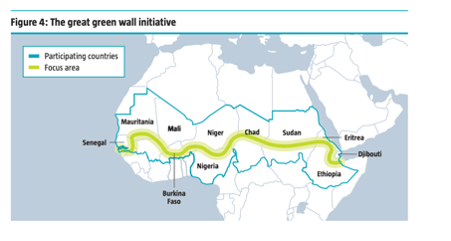Sustainable Investing - The Great Wall of Africa is taking shape.
A giant wall of trees that is being built across Africa is making a huge contribution to the UN’s Sustainable Development Goals.
The 16 km wide wall of trees, bushes and shrubs crosses Africa’s Sahel region at the southern edge of the Sahara Desert, is now 15% complete. It will eventually span almost 8,000 kms and pass through 21 countries, starting on the west coast in Senegal and ending on the east coast in Djibouti. Started in 2007, the USD 8 billion project is expected to create 350,000 jobs in one of the poorest regions of the world.
In Senegal, around 11 million drought-resistant trees such as acacias have already been planted. The millions of plants will make the ground more fertile, allowing about 100 million hectares of once lifeless desert to become agricultural land by 2030. In Ethiopia, 15 million hectares of agricultural land have already been reclaimed from the previously rapidly expanding Sahara.
Why is this important?
Once complete, the Great Green Wall will be the largest living structure on Earth, three times the size of the Great Barrier Reef. The vast expanse of greenery will be able to extract 250 million tons of carbon dioxide from
the atmosphere each year. The region is at the front line of climate change, which is causing persistent droughts and famine.
But the project is not just about improving the environment. Its promotional video says it is “growing food; growing a reason to stay for the families forced to migrate to Europe; growing green jobs, giving real incomes and opportunities; growing peace in places where conflict is widespread; and growing a response to climate change in a region where temperatures are rising faster than anywhere else on Earth.”
It is therefore making a multi-faceted contribution to the Sustainable Development Goals, as it is relevant to no less than six of them: SDG 1 (no poverty); SDG 2 (zero hunger); SDG 8 (decent work and economic growth); SDG 11 (sustainable cities and communities); SDG 13 (climate action); and SDG 15 (life on land).
What does this mean for investors?
This quote is from Robeco, but Moneyworks have a number of fund managers that use the United Nations Sustainable Development Goals (SDG’s) in the same way, to guide their investment decisions.
“The importance of SDGs to ensure a safe, healthy and economically viable future is becoming increasingly evident. The primary focus of the strategy is on companies who are positively contributing to the SDGs and moving us closer to achieving the goals.”
“Forward-thinking companies like these are not only making strides towards protecting and preserving people and planet – they are also in a strong position to benefit from the enormous tailwinds created by increased consumer demand and regulatory action towards sustainable products and services.”
“Companies in the strategy are carefully screened and selected based on the quality and intensity of their contributions across all 17 SDGs. Only companies with a high net positive impact are selected for inclusion in the portfolio. The result is a concentrated portfolio of sustainably-run, high-impact companies, diversified globally across regions and economic sectors.”
What are we doing about this at Moneyworks?
We have built a proprietary system that enables us to understand exactly where the investments that we recommend are invested (based on twice yearly declarations). We then understand the pro's and con's of these investments if they fall into the 'nasties' categories.
We are building portfolios for our clients that are fully ethical (where the investments are designed to do good for the world) and 'hybrid' (where there is strong ESG and ethical integration into the investment selection).
We analyse the investments that we recommend to make sure that they are 'true to label' and aren't greenwashing (Greenwashing is a marketing ploy companies use to make their products sound more environmentally friendly than they are. Their claims are often exaggerated, misleading and not backed up by evidence) or brownwashing - (To rebrand, cover up or divert attention from amoral, illicit or criminal activities by establishing partnerships or connections with legitimate, value-based organizations e.g. NGOs).
We are continually reviewing and tracking our recommended fund managers to make sure that their investment performance provides good returns for you and that they are 'walking the talk'.
If you want to find out more about our ethical investing approach, contact us by clicking here.


